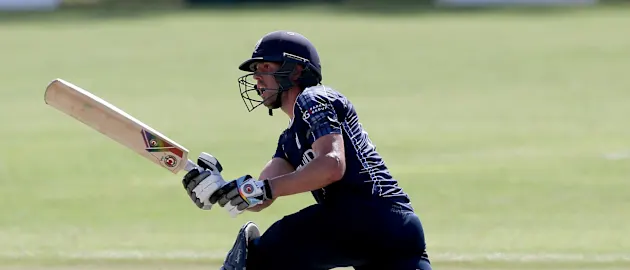Calum MacLeod has bowling ban to thank for batting career


Calum MacLeod is one of Scotland's most important players. He has been a stalwart at the top of their batting order for a long time, helping to propel the side and achieve a great deal.
His unbeaten 157 from 146 balls saw Scotland beat the much-fancied Afghanistan in their opening match of the ICC Cricket World Cup Qualifier 2018 in Zimbabwe on Sunday. The 29-year-old put on a national record 208-run stand for the third wicket with Richie Berrington to help Scotland chase down 255 in Bulawayo and give them the perfect start as they look to qualify for another World Cup.
Calum MacLeod leads Scotland to opening win
The right-hander smashed 23 fours and one six in his knock, nullifying the four-pronged spin attack of Afghanistan, which included number-one ranked ODI bowler Rashid Khan. MacLeod used the sweep shot to good effect, picking up regular boundaries to put the pressure on the opposition.
It was a brilliant innings, but we shouldn't be surprised. It is far from the first time the Glasgow-born batsman has led his side to glory: his innings was the third time he's made over 150 for his nation. What is surprising, however, is that MacLeod's career could have been very different altogether.
A sensational knock today from @calummacleod640 - he's the first Player of the Match of #CWCQ! #AFGvSCO pic.twitter.com/4rIq7m3niZ
— ICC Cricket World Cup (@cricketworldcup) March 4, 2018
As a youngster he broke through as a promising fast bowler, earning a call-up for Scotland and a county contract with Warwickshire before a decision in 2009 changed his direction completely.
“I got banned from bowling in 2009 after the World Cup," MacLeod explains. In fact he had just taken career-best figures of 4/66 against Canada, but a kink in his bowling arm was flagged up by the umpires and Scotland were forced to withdraw him from their ODI squad. With his pathway blocked, he was forced to reconsider.
"At that time I was still lucky enough to be at Warwickshire playing county cricket so I was in the perfect place," he says. "I spent another year with them just learning about the game. It wasn’t so much what I did in training, it was more about starting to learn about the game and how to bat, because I was obviously never going to be able to get back to bowling as well as I used to.
"I’ve got a passion for the game, I wanted to stay in the game and batting was a way I was able to go about it. On top of that when I finally came back up to Scotland, I think everyone involved in Scotland in that time would say it wasn’t our strongest team, so there was a space in the team and I was able to learn on the job, whereas if it was now I wouldn’t have got as many games. It’s just learning and being able to try and replicate it."
Driven by his desire to succeed in cricket, he worked tirelessly for a year at Warwickshire. And although he was eventually released county in 2010, he says he learned a great deal through working alongside international players and with top-class coaches.
“When I was younger, being at a club like Warwickshire taught me a lot of good habits, it taught me about how hard you have to work," he says. "Two of the hardest-working players I’ve ever seen are Ian Bell and Jonathan Trott. The amount they put in and the attention to detail they showed to their batting, preparation and how they went about it was something that as a 17-21 year-old you’re lucky enough to learn from.
Great start to the tournament @CricketScotland thanks for all the messages 👍 bowlers were great to set the game up for us👌 #followscotland pic.twitter.com/fmHPfyOJ7F
— Calum MacLeod (@calummacleod640) March 4, 2018
"I also had three great coaches. Dougie Brown, another Scotsman, was there and he helped me a lot and Ashley Giles, the head coach at the time, was very supportive of me. The biggest one for me was one of the greats of the game, Allan Donald. Learning from him and talking to him at 19 years old, spending a season with him, working on your bowling and learning about the game, about the things he’s done, how he sees the game; it was probably a year that was more valuable than a year of playing cricket."
"One of the exciting things in this tournament is that everyone can beat each other. We’ve got to turn up and put out our best performance."